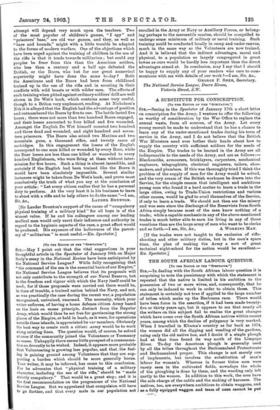pro THE EDITOR OP THE "SPECTATOR. "' SIR, —May I point out
that the vital suggestions in your thoughtful article in the Spectator of January 10th on Major Seely's essay in the National Review have been anticipated by the National Service League? While fully recognising that "the command of the sea is the essential basis of our Empire," the National Service League believes that its proposals will not only contribute to the strength of our Naval Reserve, but to the freedom and vigour with which the Navy itself could be used; for if those proposals were carried out there would be, in time of trouble, a trained nation behind the Navy, and not, as was practically the case during the recent war, a population unorganised, untrained, unarmed. The necessity, which your writer enforces, of having a home defence citizen Army based on the levie en masse principle, distinct from the Regular Army, which would thus be set free for garrisoning the strong places of the Empire, or held in leash, as it were, for operations outside these islands, is appreciated by our members. Obviously the best way to create such a citizer Army would be to work along existing lines. The question would, of course, be solved at once if the community joined the Volunteers or Yeomanry en masse. Unhappily there seems little prospect of a consumma- tion so devoutly to be wished. Indeed, it appears more probable that Volunteering is growing less popular, and that the feel- ing is gaining ground among Volunteers that they are sup- porting a burden which should be more generally borne. Your writer, it may be inferred, has come to this conclusion. For be advocates that " physical training of a military character, including the nse of the rifle," should be " made strictly compulsory." That would be a great step ; and it is the first recommendation on the programme of the National Service League. But we apprehend that compulsion will have to go further, and that every male in our population not
enrolled in the Army or Navy or Auxiliary Forces, or belong- ing perhaps to the mercantile marine, should be compelled to undergo some minimum of military or naval training. Such training could be conducted locally in camp and under canvas, much in the same way as the Volunteers are now trained. And it is believed that the indirect advantages, moral and physical, to a population so largely congregated in great towns as ours would be hardly less important than the direct advantages aimed at. In conclusion, may I say that I should be happy to supply any of your readers who care to com- municate with me with details of our work P—I am, Sir, &c.,
GEORGE P. SHEE, Secretary.
The National Service League, Dacre House, Victoria Street, S.W.






































 Previous page
Previous page